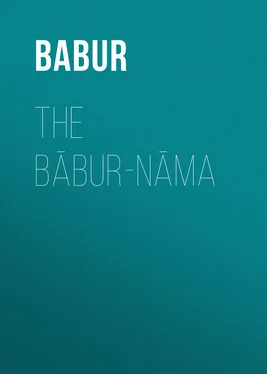Babur - The Bābur-nāma
Здесь есть возможность читать онлайн «Babur - The Bābur-nāma» — ознакомительный отрывок электронной книги совершенно бесплатно, а после прочтения отрывка купить полную версию. В некоторых случаях можно слушать аудио, скачать через торрент в формате fb2 и присутствует краткое содержание. Жанр: foreign_antique, foreign_prose, на английском языке. Описание произведения, (предисловие) а так же отзывы посетителей доступны на портале библиотеки ЛибКат.
- Название:The Bābur-nāma
- Автор:
- Жанр:
- Год:неизвестен
- ISBN:нет данных
- Рейтинг книги:4 / 5. Голосов: 1
-
Избранное:Добавить в избранное
- Отзывы:
-
Ваша оценка:
- 80
- 1
- 2
- 3
- 4
- 5
The Bābur-nāma: краткое содержание, описание и аннотация
Предлагаем к чтению аннотацию, описание, краткое содержание или предисловие (зависит от того, что написал сам автор книги «The Bābur-nāma»). Если вы не нашли необходимую информацию о книге — напишите в комментариях, мы постараемся отыскать её.
The Bābur-nāma — читать онлайн ознакомительный отрывок
Ниже представлен текст книги, разбитый по страницам. Система сохранения места последней прочитанной страницы, позволяет с удобством читать онлайн бесплатно книгу «The Bābur-nāma», без необходимости каждый раз заново искать на чём Вы остановились. Поставьте закладку, и сможете в любой момент перейти на страницу, на которой закончили чтение.
Интервал:
Закладка:
p. His battles.
He fought four battles. The first was with Ni’mat Arghūn , Shaikh Jamāl Arghūn’s younger brother, at Āqār-tūzī, near Zamīn. This he won. The second was with ‘Umar Shaikh Mīrzā at Khwaṣ; this also he won. The third affair was when he encountered Sl. Maḥmūd Khān on the Chīr, near Tāshkīnt (895 AH. -1469 AD.). There was no real fighting, but some Mughūl plunderers coming up, by ones and twos, in his rear and laying hands on his baggage, his great army, spite of its numbers, broke up without a blow struck, without an effort made, without a coming face to face, and its main body was drowned in the Chīr. 199His fourth affair was with Ḥaidar Kūkūldāsh ( Mughūl ), near Yār-yīlāq; here he won.
q. His country.
Samarkand and Bukhārā his father gave him; Tāshkīnt and Sairām he took and held for a time but gave them to his younger brother, ‘Umar Shaikh Mīrzā, after ‘Abdu’l-qadūs ( Dūghlāt ) slew Shaikh Jamāl ( Arghūn ); Khujand and Aūrātīpā were also for a time in his possession.
r. His children.
His two sons did not live beyond infancy. He had five daughters, four by Qātāq Begīm. 200
Rābi‘a-sult̤ān Begīm, known as the Dark-eyed Begīm, was his eldest. The Mīrzā himself made her go forth to Sl. Maḥmūd Khān; 201she had one child, a nice little boy, called Bābā Khān. The Aūzbegs killed him and several others of age as unripe as his when they martyred (his father) The Khān, in Khujand, (914 AH. -1508 AD.). At that time she fell to Jānī Beg Sult̤ān ( Aūzbeg ).
Ṣāliḥa-sult̤ān (Ṣalīqa) Begīm was his second daughter; people called her the Fair Begīm. Sl. Maḥmūd Mīrzā, after her father’s death, took her for his eldest son, Sl. Mas‘ūd Mīrzā and made the wedding feast (900 AH.). Later on she fell to the Kāshgharī with Shāh Begīm and Mihr-nigār Khānim.
‘Āyisha-sult̤ān Begīm was the third. When I was five and went to Samarkand, they set her aside for me; in the guerilla times 202she came to Khujand and I took her (905 AH.); her one little daughter, born after the second taking of Samarkand, went in a few days to God’s mercy and she herself left me at the instigation of an older sister.
Sult̤ānīm Begīm was the fourth daughter; Sl. ‘Alī Mīrzā took her; then Tīmūr Sult̤ān ( Aūzbeg ) took her and after him, Mahdī Sult̤ān ( Aūzbeg ).
Ma‘sūma-sult̤ān Begīm was the youngest of Sl. Aḥmad Mīrzā’s daughters. Her mother, Ḥabība-sult̤ān Begīm, was of the Arghūns, a daughter of Sl. Ḥusain Arghūn’s brother. I saw her when I went to Khurāsān (912 AH. -1506 AD.), liked her, asked for her, had her brought to Kābul and took her (913 AH. -1507 AD.). She had one daughter and there and then, went to God’s mercy, through the pains of the birth. Her name was at once given to her child.
s. His ladies and mistresses.
Mihr-nigār Khānīm was his first wife, set aside for him by his father, Sl. Abū-sa‘īd Mīrzā. She was Yūnas Khān’s eldest daughter and my mother’s full-sister.
Tarkhān Begīm of the Tarkhāns was another of his wives.
Qātāq Begīm was another, the foster-sister of the Tarkhān Begīm just mentioned. Sl. Aḥmad Mīrzā took her par amours ( ‘āshiqlār bīlā ): she was loved with passion and was very dominant. She drank wine. During the days of her ascendancy ( tīrīklīk ), he went to no other of his ḥaram ; at last he took up a proper position ( aūlnūrdī ) and freed himself from his reproach. 203
Khān-zāda Begīm, of the Tīrmīẕ Khāns, was another. He had just taken her when I went, at five years old, to Samarkand; her face was still veiled and, as is the Turkī custom, they told me to uncover it. 204
Lat̤īf Begīm was another, a daughter’s child of Aḥmad Ḥājī Beg Dūldāī ( Barlās ). After the Mīrzā’s death, Ḥamza Sl. took her and she had three sons by him. They with other sult̤āns’ children, fell into my hands when I took Ḥiṣār (916 AH. -1510 AD.) after defeating Ḥamza Sult̤ān and Tīmūr Sult̤ān. I set all free.
Ḥabība-sult̤ān Begīm was another, a daughter of the brother of Sl. Ḥusain Arghūn .
t. His amīrs.
Jānī Beg Dūldāī ( Barlās ) was a younger brother of Sl. Malik Kāshgharī . Sl. Abū-sa‘īd Mīrzā gave him the Government of Samarkand and Sl. Aḥmad Mīrzā gave him the control of his own Gate. 205He must have had singular habits and manners; 206many strange stories are told about him. One is this: – While he was Governor in Samarkand, an envoy came to him from the Aūzbegs renowned, as it would seem, for his strength. An Aūzbeg, is said to call a strong man a bull ( būkuh ). “Are you a būkuh ?” said Jānī Beg to the envoy, “If you are, come, let’s have a friendly wrestle together ( kūrāshālīng ).” Whatever objections the envoy raised, he refused to accept. They wrestled and Jānī Beg gave the fall. He was a brave man.
Aḥmad Ḥājī ( Dūldāī Barlās ) was another, a son of Sl. Malik Kāshgharī . Sl. Abū-sa‘īd Mīrzā gave him the Government of Hīrī (Harāt) for a time but sent him when his uncle, Jānī Beg died, to Samarkand with his uncle’s appointments. He was pleasant-natured and brave. Wafā’ī was his pen-name and he put together a dīwān in verse not bad. This couplet is his:
“I am drunk, Inspector, to-day keep your hand off me,
“Inspect me on the day you catch me sober.”
Mīr ‘Alī-sher Nāwā’ī when he went from Hīrī to Samarkand, was with Aḥmad Ḥājī Beg but he went back to Hīrī when Sl. Ḥusain Mīrzā (Bāī-qarā) became supreme (873 AH. -1460 AD.) and he there received exceeding favour.
Aḥmad Ḥājī Beg kept and rode excellent tīpūchāqs , 207mostly of his own breeding. Brave he was but his power to command did not match his courage; he was careless and what was necessary in his affairs, his retainers and followers put through. He fell into Sl. ‘Alī Mīrzā’s hands when the Mīrzā defeated Bāī-sunghar Mīrzā in Bukhārā (901 AH.), and was then put to a dishonourable death on the charge of the blood of Darwesh Muḥammad Tarkhān. 208
Darwesh Muḥammad Tarkhān ( Arghūn ) was another, the son of Aūrdū-būghā Tarkhān and full-brother of the mother of Sl. Aḥmad Mīrzā and Sl. Maḥmūd Mīrzā. 209Of all begs in Sl. Aḥmad Mīrzā’s presence, he was the greatest and most honoured. He was an orthodox Believer, kindly and darwesh-like, and was a constant transcriber of the Qu’rān. 210He played chess often and well, thoroughly understood the science of fowling and flew his birds admirably. He died in the height of his greatness, with a bad name, during the troubles between Sl. ‘Alī Mīrzā and Bāī-sunghar Mīrzā. 211
‘Abdu’l-‘alī Tarkhān was another, a near relation of Darwesh Muḥammad Tarkhān, possessor also of his younger sister, 212that is to say, Bāqī Tarkhān’s mother. Though both by the Mughūl rule ( tūrā ) and by his rank, Darwesh Muḥammad Tarkhān was the superior of ‘Abdu’l-‘alī Tarkhān, this Pharoah regarded him not at all. For some years he had the Government of Bukhārā. His retainers were reckoned at 3,000 and he kept them well and handsomely. His gifts ( bakhshīsh ), his visits of enquiry ( purshīsh ), his public audience ( dīwān ), his work-shops ( dast-gāh ), his open-table ( shīlān ) and his assemblies ( majlis ) were all like a king’s. He was a strict disciplinarian, a tyrannical, vicious, self-infatuated person. Shaibānī Khān, though not his retainer, was with him for a time; most of the lesser (Shaibān) sult̤āns did themselves take service with him. This same ‘Abdu’l-‘alī Tarkhān was the cause of Shaibānī Khān’s rise to such a height and of the downfall of such ancient dynasties. 213
Читать дальшеИнтервал:
Закладка:
Похожие книги на «The Bābur-nāma»
Представляем Вашему вниманию похожие книги на «The Bābur-nāma» списком для выбора. Мы отобрали схожую по названию и смыслу литературу в надежде предоставить читателям больше вариантов отыскать новые, интересные, ещё непрочитанные произведения.
Обсуждение, отзывы о книге «The Bābur-nāma» и просто собственные мнения читателей. Оставьте ваши комментарии, напишите, что Вы думаете о произведении, его смысле или главных героях. Укажите что конкретно понравилось, а что нет, и почему Вы так считаете.











